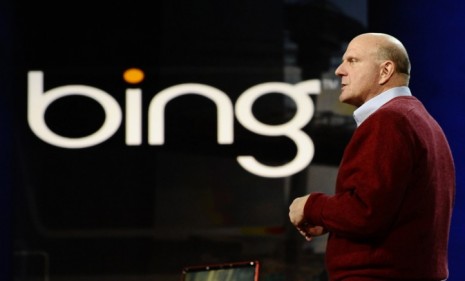Bing's 'daunting mission' to beat Google: 5 talking points
Microsoft has already spent billions to take on the Google search juggernaut, and it's not giving up. Here's what you need to know

A free daily email with the biggest news stories of the day – and the best features from TheWeek.com
You are now subscribed
Your newsletter sign-up was successful
When it comes to search engines, Google is the obvious giant, but rival Microsoft isn't giving up the fight. The New York Times reports on Microsoft's ongoing, "daunting mission" to take on Google with its relatively new Bing search engine. Here, five points of note:
1. It's a costly fight
It's estimated that Microsoft is spending $5 billion a year to compete with Google in the search realm. In the last fiscal year, which ended in June, Microsoft's online services division, of which Bing constitutes the majority, lost $2.56 billion.
The Week
Escape your echo chamber. Get the facts behind the news, plus analysis from multiple perspectives.

Sign up for The Week's Free Newsletters
From our morning news briefing to a weekly Good News Newsletter, get the best of The Week delivered directly to your inbox.
From our morning news briefing to a weekly Good News Newsletter, get the best of The Week delivered directly to your inbox.
2. But Microsoft is making gains
Introduced two years ago, Bing now accounts for 14 percent of internet searches in America, according to comScore. If you take into account the searches that Bing handles for Yahoo, as a result of a partnership that started last year, Microsoft handles 30 percent of searches.
3. And it's focusing on innovation
Microsoft is focused on being a "decision engine" rather than simply a search engine. "To break through, we have to change the game," says Qi Lu, the president of Microsoft's online services division. While traditional search is typically focused on nouns, rounding up "collectible figurines" or "software tips," Lu says that "the future of search is verbs — computationally discerning user intent to give them the knowledge to complete tasks." Bing's goal is to let a user state a desire, say "dinner for two on Friday and a movie," and then generate dinner and movie options based on her personal food and film preferences, her location, input from her Facebook friends' likes (via Bing's deal with Facebook), and, say, movie availability from Fandango. Lu's vision is "part intelligent software assistant and part mind reader."
A free daily email with the biggest news stories of the day – and the best features from TheWeek.com
4. But Google is also innovating
The search giant has been acquiring new technology to retain its stronghold. In April, following Justice Department approval, Google purchased ITA Software, a system that collects and organizes travel information, for $700 million. In 2010 and 2009 respectively, Google picked up MetaWeb and Powerset, start-ups with technologies that can help it better discern the intentions behind search terms, not just the words themselves.
5. And Google's power is self-perpetuating
Google is the market leader in search, "the habitual choice," says Steve Lohr in The New York Times. Once a search engine becomes a habit, the "cycle of prosperity snowballs — more users, more data, and more ad dollars."
-
 The 8 best TV shows of the 1960s
The 8 best TV shows of the 1960sThe standout shows of this decade take viewers from outer space to the Wild West
-
 Microdramas are booming
Microdramas are boomingUnder the radar Scroll to watch a whole movie
-
 The Olympic timekeepers keeping the Games on track
The Olympic timekeepers keeping the Games on trackUnder the Radar Swiss watchmaking giant Omega has been at the finish line of every Olympic Games for nearly 100 years